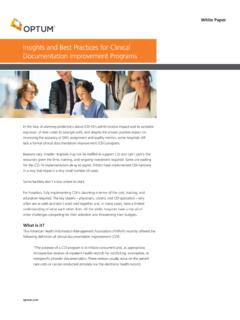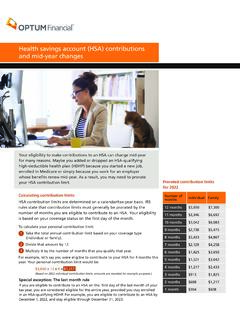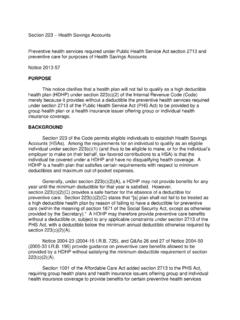Transcription of HSAs and Medicare - Optum
1 HSAs and MedicareMedicare and HSA eligibilityMany individuals are confused at the intersection of health savings accounts (HSAs) and Medicare . Two different federal agencies have primary responsibility for these programs the Department of Health and Human Services, for Medicare , and the Department of the Treasury, for HSAs. Each agency issues rules related to its products without consideration of the interaction with the other product, leaving Americans confused. The following information is designed to help you navigate this confusion so that you remain in compliance with HSA Do I lose my HSA eligibility at age 65? No. You can open and contribute to an HSA at age 65 or later as long as you meet HSA eligibility requirements, which are: You re covered on an HSA-qualified medical plan.
2 You re not someone s tax dependent. You don t have any conflicting coverage (including enrollment in Medicare ).Turning age 65 does not, in and of itself, preclude you from remaining HSA-eligible absent any disqualifying Does enrollment in Medicare impact my HSA eligibility?Yes. Medicare doesn t offer an HSA qualifying option. You can t make contributions to your HSA for any months after you enroll in any part of Medicare , even if you re also covered on an HSA qualifying Aren t I automatically enrolled in Medicare Part A at age 65?No. You re enrolled in Part A (inpatient services) automatically only if you are age 65 or older and receiving Social Security or Railroad Retirement benefits.
3 You re enrolled in Part A and Part B (outpatient services like doctor visits, lab work and imaging) automatically if you re collecting Social Security disability benefits or are diagnosed with amyotrophic lateral sclerosis (ALS, or Lou Gehrig s disease). Otherwise, you must sign up to receive coverage through more information on Medicare enrollment, please refer to Medicare & You (available online) or call the Social Security Administration customer service center at 1- 8 0 0 -772-1213. 4. If my spouse and I are enrolled on my employer s HSA-qualified plan and I enroll in Medicare , can he open an HSA?Yes, if your spouse is otherwise HSA-eligible. Individuals don t have to be the medical plan subscriber to be HSA-eligible.
4 You or your spouse can then make tax-deductible contributions into their HSA, up to the family maximum if you remain covered on a family contract (even if only your spouse is HSA-eligible). For some couples, this provision in the law allows them to continue to contribute to an HSA (and build income tax-free balances for distribution in retirement) for several years after the older spouse enrolls in If I m not HSA-eligible, can I enroll in my employer s HSA-qualified plan?Yes. HSA eligibility refers to your ability to open and contribute to an HSA, not whether or not you can enroll in a medical plan. As long as you meet your employer s and the medical insurer s eligibility requirements, you can enroll in an HSA qualifying medical plan.
5 If you re not HSA-eligible, though, you can t open and contribute to an HSA. Your employer may offer a health flexible spending account (FSA) or health reimbursement arrangement (HRA) through which you can reimburse eligible expenses income tax-free. Medicare and HSA contributions6. Can I continue to contribute to my HSA once I m enrolled in Medicare ?No. You lose HSA eligibility once you enroll in Medicare , so you can t make additional contributions. You can contribute for months that you were eligible before you enrolled in Medicare . For example, if your 65th birthday is May 6 and you enroll in Medicare immediately, your effective date of Medicare coverage is May 1.
6 You can make contributions for the months of January, February, March and April at any point up to the date that you file your personal income tax returns for that year, even though you may not be HSA-eligible at the time that you make your retroactive contribution for those Can I contribute to my spouse s HSA if I m enrolled in Medicare and no longer HSA-eligible?Yes, if your spouse is HSA-eligible and has an HSA, you or anyone else can contribute to their HSA. Your enrollment in Medicare doesn t disqualify your spouse from contributing to (or accepting contribution from others into) their HSA. You can contribute personal funds, either through post-tax payroll (you can set up a payroll deduction to send money directly to your spouse s HSA) or with personal funds.
7 Your spouse then deducts these contributions on their (or if you re filing jointly, your joint) personal income tax and HSA distributions8. I m no longer HSA-eligible. Can I make income tax-free distributions for qualified medical expenses?Yes. HSA eligibility relates to your ability to make contributions. Once you open an HSA, you can make income tax-free distributions for qualified medical expenses for the rest of your life, as long as you still have a balance in your Which expenses can I reimburse from my HSA once I m enrolled in Medicare ?You can still reimburse, income tax-free, all qualified medical out-of-pocket expenses not reimbursed by other insurance or other sources, including: Medical plan deductibles Copay and coinsurance Dental and vision expenses Insulin and diabetic supplies Over-the-counter drugs and medicine with a prescription In addition, you can reimburse certain insurance premiums, including premiums for: Medicare Parts B and D Medicare Part C ( Medicare Advantage plans offered by private insurers that replace Medicare coverage) Some Medicare supplement plans10.
8 Whose qualified medical expenses can I reimburse income tax-free from my HSA?You can reimburse your own, your spouse s and any tax dependents (such as an adult disabled child s) expenses income tax-free from your HSA. These other family members don t need to be HSA-eligible themselves or covered on your medical plan for you to make income tax-free distributions from your HSA to reimburse their qualified medical expenses tax-free. Note: You can t reimburse your own or anyone else s Medicare premiums income tax-free until you, the account owner, turn age 65. If you have an older spouse and want to reimburse their Medicare premiums income tax-free, they must open an HSA before they enroll in Medicare and contribute at least the $1,000 annual catch-up contribution.
9 They can use this to cover their Medicare premiums until you turn age 65 and can reimburse their premiums income tax-free from your HSA. In addition, when both of you are HSA-eligible and covered on a family HSA-qualifying or compatible medical plan, you can split the family maximum contribution between your two HSAs as you My spouse and I both have an HSA. Do we have to limit distributions from each HSA to our own expenses?No. You can reimburse each other s expenses from your respective HSAs as long as you remain married. You can t combine accounts, but you may choose to reimburse both your and your spouse s expenses from one HSA to exhaust the balance in that account.
10 Then, you have to manage (and perhaps pay monthly administration/maintenance fees) on only one account without losing the ability to reimburse an expense that either of you incurs (as long as you remain married).12. Can I make income tax-free distributions from my HSA for non-qualified medical expenses when I turn age 65?No. Distributions for non-eligible expenses are always included in your taxable income, putting these withdrawals on par with taxes on distributions from a traditional 401(k) or traditional IRA. Once you turn 65 or meet Social Security s definition of disabled, you can make distributions for items that aren t HSA-qualified without incurring the 20 percent additional tax (penalty) otherwise assessed to non-qualified medical If I pass away first, can my HSA continue to reimburse my spouse s qualified medical expenses income tax-free?












